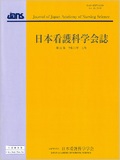Japanese
English
- 販売していません
- Abstract 文献概要
- 参考文献 Reference
要旨
目的:術後補助療法としてホルモン療法を受ける乳がん患者の更年期症状に影響を及ぼす反すう傾向とソーシャルサポートの関係を明らかにし,看護の示唆を得る.
方法:拡張版反応スタイル尺度,更年期症状(簡略更年期指数:SMI),ソーシャルサポート尺度,個人属性について自記式質問紙を用いた横断的調査を実施した.
結果:2施設160名に調査票を配布し,回答を得た132名のうち分析可能な104名を対象とした(回収率82.5%,有効回答率78.8%).SMI得点は年齢群での差が認められた.両年齢群共に反すうのネガティブな内省と更年期症状に正の相関が認められた.54歳以下ではネガティブな内省によりソーシャルサポートの知覚の低下につながり,55歳以上では問題への直面化によりサポートを多く知覚することが示された.
結論:必要なサポートを提供することおよびソーシャルサポートが入手可能と認識できるような援助が必要である.サポート提供者の存在を確認するだけでなく,患者の年齢や反すうを考慮した支援を行う必要がある.
Purpose: This study aimed to determine the effects of the relationship between rumination patterns and social support on menopausal symptoms in breast cancer patients receiving adjuvant hormonal therapy.
Methods: The cross-sectional study included 160 patients aged 20 and above with breast cancer receiving adjuvant hormonal therapy, who visited one of the two hospitals identified for the study. Patients were divided into two groups based on their age: 54 years old or less and 55 years old or more. Rumination patterns (Expanded Response Styles Questionnaire), social support (Social Support Scale by Fukuoka, 2000), menopausal symptoms (simplified menopause index: SMI), and basic attributes were assessed using written questionnaires.
Results: The study reply rate was 82.5%, and the valid response rate was 78.8%. Mean differences of SMI scores were found between the age groups. Weak or moderate correlations were found between negative rumination and SMI in each age group using multiple group analysis. The results indicated that negative rumination decreased the perception of social support in the younger group. On the other hand, facing the fact of rumination was correlated with more social support in the older group.
Conclusion: Patients should be provided appropriate support based on age and rumination patterns and encouraged to receive social support. Confirmation of the availability of support for each patient is necessary.
Copyright © 2021, Japan Academy of Nursing Science. All rights reserved.


